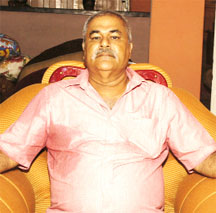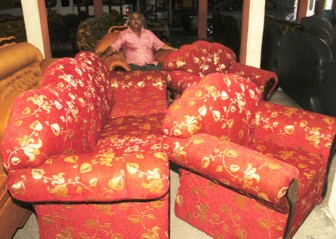Come 2013 Ramroop’s Furniture Store will be celebrating forty years in the household furnishing industry and the proprietor, Dinesh Narine looks back on the impact which the enterprise has made on the sector with a considerable sense of accomplishment.
Situated at 14 Lombard Street, Charlestown, Ramroop’s Furniture Store was registered in the name of Hardauth Narine, the father of the current owner, on February 28, 1973. The name Ramroop, Dinesh says, is an older trading name that belonged to his grandfather Ramroop Narine. The store quickly established a reputation for ‘meeting the pocket’ of working class Guyanese and its modest prices coupled with its convenient layaway plan were more than enough ‘advertising’ to render it popular with urban inner city residents. Its primary accomplishment, in Dinesh’s view is the fact that it has survived both the ups and downs of the Guyana economy as well as the advent of tough competition from both local and imported furniture.
Dinesh does not readily recall when the second branch of the store opened in Camp Street, obliquely opposite Demerara Bank. However, following the death of his father in 1986 he assumed responsibility for both branches. Subsequently, management challenges compelled him to liquidate the Camp Street branch. Along with his two sons, Dinesh currently operates the older Lombard street branch. There are, he says, no immediate plans for expansion, nor for that matter does he harbour ambitions of accessing the overseas market though he does not rule out the possibility that his sons might take the business to ‘the next level.’

Over time the younger Ramroop has scaled down his father’s more lofty ambitions. Up until 1986 when his father died Ramroop’s had been a household name in the manufacture of a range of furniture. These days Ramroop’s focus is on distribution.. Contractual arrangements with various manufacturers allow him to access furniture at what he considers to be competitive prices.
Dinesh says that Guyana provides “a good market” for furniture all year round. It is during the last quarter, however, that business really “takes off.” However heavy the demand, Dinesh says that he has always resisted the idea of offering customers hire purchase arrangements. Instead he provides the popular lay away option, that allows customers “to pay as much as they can at a time” and uplift the item after the full price has been paid.
Dinesh says that the challenges of the industry have become increasingly difficult to cope with over the years, ranging as they do from the problems in the local timber industry to the competition afforded by the growing influx of furniture imports. While critics have placed the blame for sub-standard furniture on what they say is the declining quality of local craftsmanship, Dinesh believes that the problem lies primarily with the quality of the wood being produced in the sector. “People still have furniture which they bought from us fifteen or twenty years ago,” Dinesh says. “What we got over the last ten to fifteen years is furniture made of a mixture of plyboard and proper lumber. We are also importing material to make furniture….a product called medium density fibre. The joiners are complaining that it is difficult to procure cured wood so that when they do get quality wood the cost of the furniture goes up. It’s either that or you buy the furniture made of material that will not hold up.”

Dinesh believes that the problems facing the timber industry could have a disastrous knock-on effect on other sectors of the economy, including joinery. Other industries, including the furniture sector are likely to face closure.
For all the challenges including reduced market share, Dinesh says that his family enterprise continues to hold its own on account of customers who still have faith in the local furniture industry. He says that the company still goes to the trouble to seek out “quality furniture” in order to suit the tastes of customers who continue to favour local products to imports.
In recent years Ramroop’s has benefitted from the expansion of the housing industry and the commensurate demand for household furnishings. Dinesh says that the company has benefitted from the patronage of new home owners in a number of rural areas including Ann’s Grove, Tuschen, Diamond/Grove and Parfait Harmonie, a development which he believes is testimony to the reputation which the company has established for its competitive prices. Linden, too, has been a good market for the company. In addition to those items of furnishings that can be bought from the show window the proprietor says that his company can arrange to have its contracted joiners build pieces of furniture based on customers’ designs.
With his establishment approaching forty Dinesh feels a sense of accomplishment based as much on its longevity as on its success. The challenges he says have been compensated for by the fact that many customers have remained loyal over the years and that Ramroop’s has come to be recognized as much for its delivery of quality products as for its competitive prices. Unlike some business establishments that say otherwise Dinesh says that he holds no lofty short to medium term ambitions. He plans to “stick to the basics,” keep the establishment going and continue to focus on providing what he considers quality service. The more lofty ambitions he leaves to his two sons.





